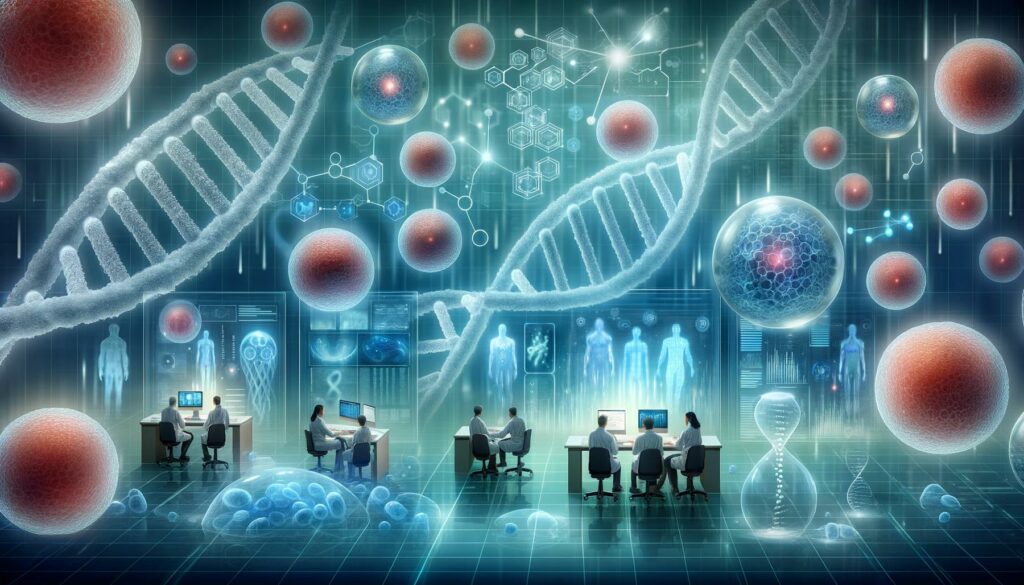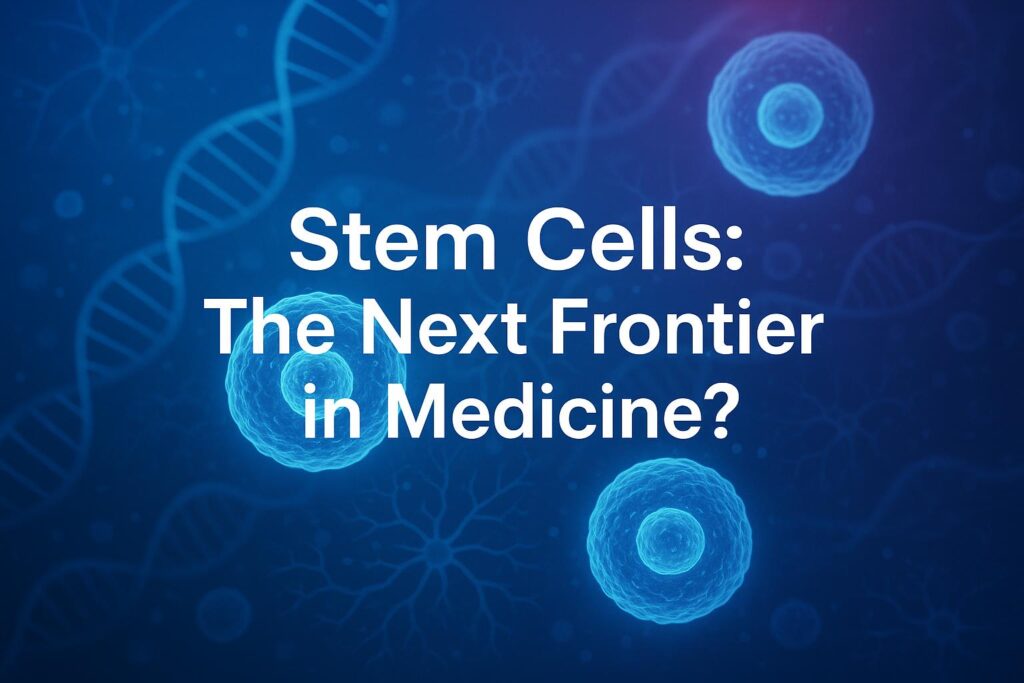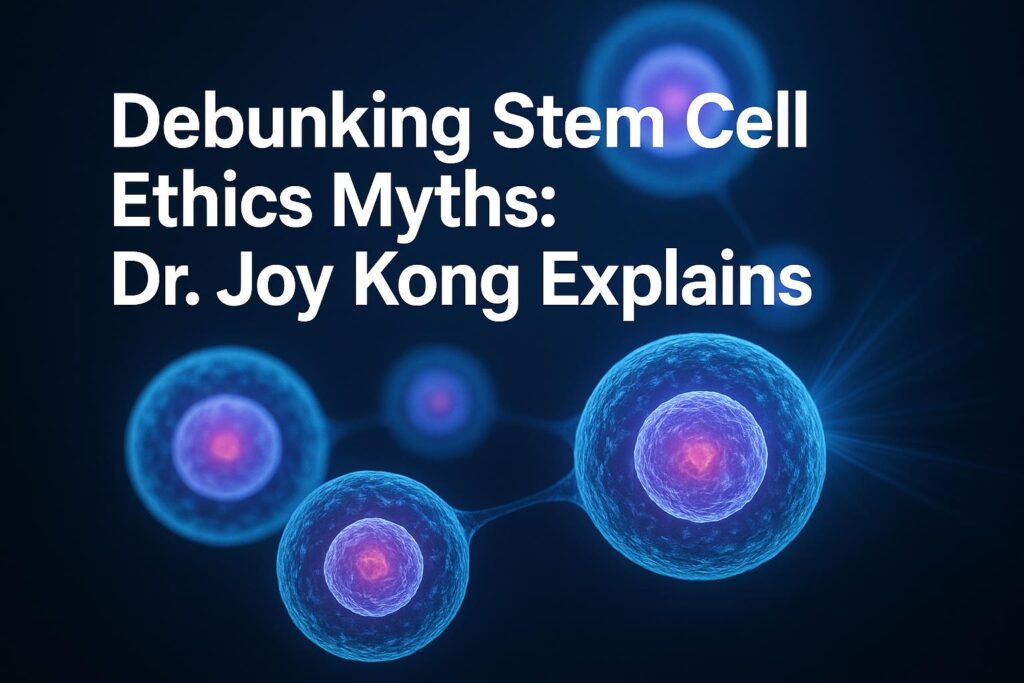In the tapestry of modern medical marvels, stem cells embroider the promise of revolutionary change. They are the quintessence of biological versatility, embodying the potential to morph into various cell types and mend the afflicted tissues and organs.
Their discovery was not a sudden revelation, but a gradual unveiling through meticulous stem cell research that opened the door to what we now dare to envision: Personalized Medicine.
This form of medicine isn’t a one-size-fits-all approach, rather it’s tailored to the genetic and cellular signature of each individual, promising treatments with a higher degree of precision and effectiveness.
However, it’s not without its share of challenges. The lofty ambition of personalized medicine requires a robust understanding of the human body’s cellular behavior, and herein lies the profound potential of harnessing stem cells.
A Brief Traverse through the Realm of Stem Cells
Stem cells are akin to nature’s blank canvas, possessing the ability to differentiate into a myriad of different cell types that constitute the human body. There are several types of stem cells, each with unique properties and potential applications.
Embryonic stem cells, for instance, are like the master keys capable of unlocking any cellular identity. On the other end of the spectrum, somatic cells are more like specialists, with a narrowed scope of what they can become.
In between, we have induced pluripotent stem cells, engineered in the lab by reprogramming adult cells to regain the embryonic-like potential.
The unveiling of induced pluripotent stem cells was a watershed moment that expanded the horizon of stem cell biology, offering a less controversial and more accessible avenue for research and application.
The Odyssey towards Personalized Medicine
Personalized medicine is not a novel concept but has gained momentum with the advancements in genomic and cellular science.
It is the idea of concocting medical interventions that are tailor-made to the individual nuances of each patient. Yet, for all its promise, personalized medicine still navigates through uncharted waters, with challenges like genetic variations and drug resistance looming large.
However, the integration of stem cells into this paradigm is like having a versatile Swiss Army knife in our medical toolkit, providing the resources needed to pioneer new frontiers in patient-centric care.
With the stage set, let us delve deeper into how the convergence of stem cells and personalized medicine is poised to herald a new era in healthcare, transforming the very fabric of how we perceive and administer medical interventions.
Through the ensuing sections, we’ll embark on a journey exploring the synergy between stem cells and personalized medicine, real-world applications, ethical landscapes, economic implications, and the road ahead filled with challenges and hope.
This discourse aims not just to inform but to kindle a conversation on how we, as a collective, can harness the full spectrum of opportunities that stem cells present to pioneer the future of medicine.
The Convergence of Stem Cells and Personalized Medicine
The meeting point of stem cells and personalized medicine is akin to the confluence of two mighty rivers, each augmenting the other’s potential to create a boundless ocean of therapeutic possibilities. The ability to tailor medical treatments to individual patients’ genetic and cellular profiles isn’t just a leap, but a quantum jump towards medical excellence.
Tailoring Treatments: A Cellular Couture
One of the most riveting aspects of stem cells is their potential to be used in personalized cell therapies. Imagine if we could design treatments the same way a tailor crafts a bespoke suit, cutting and stitching each part to fit the unique contours of an individual.
Stem cells offer a semblance of this in the cellular realm. They can be manipulated to develop into any cell type needed to repair or replace damaged tissues in a patient’s body. This bespoke approach to medicine ensures that treatments are highly effective and bear minimal side effects.
Overcoming Existing Limitations: A Cellular Shield
At times, personalized medicine’s voyage resembles sailing against the tide, with genetic variations and drug resistance posing as formidable storms. However, stem cells, with their chameleon-like ability to adapt and transform, provide a sturdy shield. For instance, induced pluripotent stem cells can be employed to model diseases, allowing a sneak peek into the cellular and molecular underpinnings of how certain maladies operate, especially in the face of genetic variations.
Real-world Applications and Case Studies
The theoretical allure of stem cells is being translated into real-world applications, with regenerative medicine and drug discovery leading the charge.
Regenerative Medicine: The Phoenix of Medical Science
Regenerative medicine is akin to a phoenix rising from the ashes, embodying the hope of restoring lost or damaged tissues and organs. Stem cells play the protagonist in this narrative.
Tissue Engineering and Organ Regeneration
Imagine a world where organ waitlists are a thing of the past. Through stem cell biology, we are inching closer to a reality where organs can be engineered in the lab, tailored to the immunological and physiological profile of each patient. This is not a flight of fancy but a tangible aim grounded in the blossoming field of tissue engineering.
Case Study: Personalized Organ Transplants
Various institutions have embarked on clinical trials to explore the feasibility and efficacy of stem cell-based organ transplants. The nascent successes in this domain are kindling hope and showcasing a novel pathway where personalized medicine and stem cells are the linchpins.
Drug Discovery and Toxicology Testing: A Cellular Litmus Test
The road to discovering new drugs is long, winding, and riddled with uncertainties. However, stem cells offer a shortcut by serving as a cellular litmus test.
Individualized Drug Testing and Development
Utilizing human pluripotent stem cells, researchers can model diseases and test drug efficacy and toxicity on a cellular level. This not only accelerates the drug discovery process but also ensures that the drugs are compatible with the patient’s unique cellular and genetic makeup.
Case Study: Tailored Drug Formulations for Rare Genetic Disorders
The application of stem cells in creating patient-specific drug formulations is a ray of hope for individuals plagued with rare genetic disorders. By understanding the cellular behavior through stem cell lines, scientists can concoct drug formulations that are highly effective and personalized.
The unfolding chapters of stem cell application in personalized medicine are a testimony to the indomitable spirit of scientific curiosity and the relentless pursuit to enhance the quality of human life. Through the lens of ethical scrutiny and economic analysis, let’s further explore the wider implications and the boundless horizon that this fusion presents.
Ethical Considerations and Regulatory Landscape
The quest to harness the potential of stem cells in personalized medicine inevitably invites a myriad of ethical quandaries and regulatory hurdles. As we venture into this new frontier, it’s imperative to navigate the moral and legal labyrinth with a discerning eye.
Ethical Debates: Treading the Moral Tightrope
The ethical discourse surrounding stem cell use, particularly embryonic stem cells, is a complex tapestry of differing societal, religious, and individual beliefs.
Ethical Implications of Stem Cell Use
The crux of the ethical debate often orbits around the source of stem cells, especially when derived from embryos. Moreover, the potential for cloning and the creation of designer babies looms like a specter over the discourse, urging a careful examination of the moral boundaries.
Cultural and Societal Perspectives
Different cultures and societies harbor varying perspectives on stem cell use. The global discourse is a melting pot of diverse beliefs, each contributing to the shaping of ethical guidelines and regulatory frameworks.
Regulatory Framework: Navigating the Legal Maze
The regulatory realm governing stem cell research and personalized medicine is a dynamic and often intricate landscape.
Current Regulations
The current regulatory frameworks aim to strike a delicate balance between fostering innovation and ensuring safety and ethical compliance. The parameters set by authorities like the FDA and analogous bodies worldwide play a crucial role in guiding the trajectory of stem cell-based personalized medicine.
Future Projections of Regulatory Evolution
As the field matures, regulations are bound to evolve to accommodate the burgeoning discoveries and to address the emerging ethical and safety concerns. The dialogue between the scientific community, regulatory bodies, and the public is instrumental in sculpting a conducive regulatory environment.
Economic Implications and Accessibility
The economic dialogue surrounding the fusion of stem cells and personalized medicine is as crucial as the scientific and ethical discourse.
Cost Analysis: Investment and Long-term Benefits
The initial investment required for stem cell-based personalized medicine is substantial. However, the long-term cost benefits could be monumental, potentially reducing the financial burden of chronic diseases and long-term healthcare.
Investment Required
Venturing into the realm of personalized medicine using stem cells necessitates substantial investment in research, clinical trials, and infrastructure.
Long-term Cost Benefits
The potential to offer more effective and tailored treatments could significantly reduce the recurrence of diseases and associated healthcare costs in the long run.
Accessibility and Equity: Bridging the Healthcare Chasm
The promise of personalized medicine should not be an elitist dream but a global reality.
Addressing Disparities in Access
The current disparities in access to cutting-edge medical treatments are a stark reminder of the healthcare chasm that exists. It’s imperative to devise strategies to democratize access to stem cell therapies and personalized medicine.
Strategies to Improve Global Accessibility and Affordability
Collaborations between governments, the private sector, and non-profit organizations can play a pivotal role in fostering accessibility and affordability, paving the way for a more inclusive healthcare landscape.
Future Prospects and Challenges

As we stand on the cusp of a medical renaissance powered by stem cells and personalized medicine, the horizon is both promising and challenging.
Technological Advancements and Research Directions
The marriage between technology and biology is ushering in a new epoch in stem cell research and personalized medicine.
Next-Generation Sequencing and Other Technological Advancements
Technologies like next-generation sequencing are deepening our understanding of stem cell biology and the genetic underpinning of diseases, propelling the field towards novel therapeutic frontiers.
Future Research Areas
The path ahead beckons a deeper exploration into the realms of gene therapy, cell engineering, and the development of novel cell therapies to combat a wider spectrum of diseases.
Challenges and Possible Solutions
The journey is riddled with both biological and technical challenges, each a puzzle waiting to be solved.
Technical and Biological Challenges
The technical challenges span from the need for robust methods to manipulate stem cells, to the biological challenges of ensuring safety and efficacy in cell therapies.
Proposing Solutions
Innovative solutions emanating from a confluence of multidisciplinary collaborations promise to overcome the hurdles, propelling us closer to the day where personalized medicine is the norm, not the exception.
FAQ
Q: What is stem cell research?
A: Stem cell research involves the study of cells that have the remarkable potential to develop into many different cell types in the body. These cells are known as stem cells and they can be used to generate healthy cells and tissues.
Q: What is the future of medicine with stem cells?
A: Stem cells hold great promise in the field of medicine. They have the potential to revolutionize the way we diagnose, treat, and prevent diseases. With the ability to regenerate damaged tissues and organs, stem cell therapies can offer personalized and targeted treatments.
Q: What is the role of stem cell therapy in personalized medicine?
A: Stem cell therapy plays a crucial role in personalized medicine. By utilizing the unique properties of stem cells, doctors can tailor treatments to the specific needs of individual patients. This approach has the potential to lead to more effective and safer therapies.
Q: What is a clinical trial in the context of stem cell research?
A: A clinical trial is a research study that involves human participants to test the safety and effectiveness of new treatments or therapies. In the context of stem cell research, clinical trials are conducted to assess the potential of stem cell therapies in treating various diseases.
Q: How does gene therapy relate to stem cell research?
A: Gene therapy is a form of treatment that aims to correct genetic disorders by introducing genetic material into a patient’s cells. Stem cells can be used as a delivery system for gene therapy, allowing targeted gene modifications in specific cells or tissues.
Q: What are the different types of stem cells used in research?
A: There are several types of stem cells used in research, including embryonic stem cells, induced pluripotent stem cells (iPSCs), mesenchymal stem cells, and hematopoietic stem cells. Each type has its own unique properties and potential applications.
Q: What is the difference between pluripotent cells and differentiated cells?
A: Pluripotent cells have the ability to develop into any cell type in the body, while differentiated cells have already specialized into specific cell types. Pluripotent cells, such as embryonic stem cells, have the potential to generate various tissues and organs.
Q: What is the role of stem cell clinics in the field of stem cell research?
A: Stem cell clinics provide treatments using stem cell therapies. While some clinics offer approved and evidence-based treatments, others may offer unproven or experimental therapies. It is important to research and choose reputable clinics with validated treatments.
Q: How can stem cells be used to treat cancer?
A: Stem cells can be used in the treatment of cancer through various approaches. For example, hematopoietic stem cell transplantation is commonly used in the treatment of blood cancers. Researchers are also exploring the use of engineered stem cells to target and destroy cancer cells.
Q: What is the role of stem cell pioneers in advancing personalized medicine?
A: Stem cell pioneers are individuals who have made significant contributions to the field of stem cell research and personalized medicine. Their groundbreaking work has paved the way for innovative therapies and has brought us closer to realizing the full potential of stem cells in healthcare.
Conclusion
The odyssey to harness the boundless potential of stem cells to pioneer personalized medicine is a testament to human ingenuity and the relentless pursuit of better healthcare paradigms.
As we continue to unravel the mysteries of stem cells and explore the vast therapeutic landscapes of personalized medicine, we are not just rewriting the medical textbooks, but reimagining the very essence of healthcare.
The confluence of stem cells and personalized medicine is more than a scientific endeavor; it’s a hope, a vision, and a journey towards a future where the essence of individuality is at the core of medical excellence.


